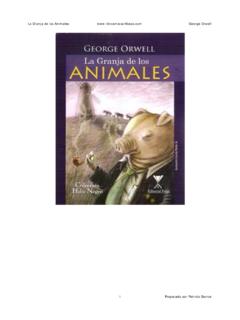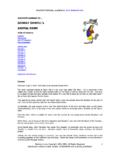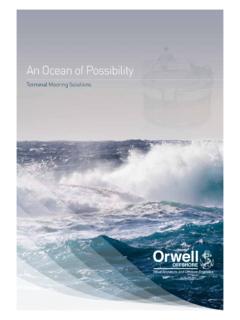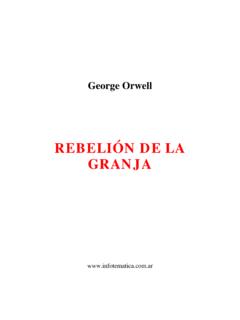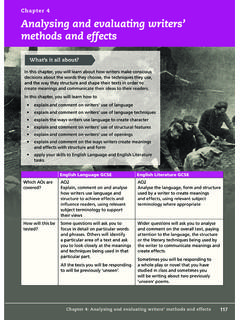Transcription of Propaganda and Surveillance in George Orwell’s Nineteen ...
1 2010, Global Media Journal -- Canadian Edition ISSN: 1918-5901 (English) -- ISSN: 1918-591X (Fran ais) Volume 3, Issue 2, pp. 49-66 Propaganda and Surveillance in George orwell s Nineteen Eighty-Four: Two Sides of the Same Coin Michael Yeo Laurentian University, Canada Abstract: Propaganda and Surveillance are pervasive in contemporary society. Extensive literatures have developed around each. George orwell s Nineteen Eighty-Four is an important point of reference in both literatures. orwell takes both Propaganda and Surveillance to extreme limits: total Surveillance and total Propaganda . Writing them large he brings important aspects of each into sharp relief, which is why his novel has the iconic status that it does for theorists in both literatures. However Nineteen Eighty-Four is of interest not just for its potential contribution to theorizing about Propaganda or about Surveillance .
2 Propaganda and Surveillance in the novel are not just accidentally related but essentially linked. I show how they work not just individually but in tandem in orwell s text, playing complementary roles in an absurd project of total social control directed not just at behaviour but also thought. Relating Propaganda and Surveillance in a sustained and systematic reading of the novel reveals it to be an even richer resource for theorizing about either Surveillance or Propaganda than it is when read, as it typically is, with an emphasis on one or the other. Additionally, from a literary perspective this reading opens up what I believe is a fresh perspective on the novel and makes it more inviting for a thoughtful and rewarding reread. Keywords: Bentham; Big Brother; orwell ; Panopticon; Propaganda ; Social Control; Spying; Surveillance Michael Yeo 50R sum : La propagande et la Surveillance sont omnipr sentes dans la soci t contemporaine.
3 De la litt rature approfondie a t d velopp e autour de chacun des th mes. Le livre Nineteen Eighty-Four de George orwell , est un important point de r f rence pour les deux litt ratures. orwell pousse les deux notions l extr me soit propagande totale et Surveillance totale. En crivant sur ces th mes au sens large, il met en relief les aspects importants de chacun, ce qui explique pourquoi son roman a obtenu le statut d ic ne pour les th oriciens de chacune des litt ratures. Cependant, Nineteen Eighty-Four n est pas seulement d int r t pour sa contribution potentielle la th orisation de la propagande ou de la Surveillance . Dans le roman, la propagande et la Surveillance ne sont pas accidentellement reli es, mais essentiellement li es.
4 Cet article d montre comment elles fonctionnent non seulement individuellement, mais aussi en tandem dans le texte d orwell en jouant des r les compl mentaires dans un projet absurde de contr le social total, r alis non seulement sur le comportement, mais aussi la pens e. Lier la propagande et la Surveillance dans une lecture soutenue et syst matique se r v le tre une source plus riche pour la th orisation des deux notions plut t que lorsque la lecture est faite en mettant l emphase sur l une ou l autre. Du point de vue litt raire, ce type de lecture offre une nouvelle perspective du roman et le rend plus attrayant pour une relecture r fl chie et enrichissante. Mots-cl s: Bentham; Big Brother; Contr le Social; Espionnage; orwell ; Panoptique; Propagande; Surveillance Ours has been called an Age of Propaganda and a Surveillance Society , as if each gets at something fundamental about our George orwell s Nineteen Eighty-Four is an important point of reference for both points of view.
5 The reason for its centrality is obvious: the novel takes Propaganda and Surveillance to extreme limits, thus bringing essential aspects of each into sharp relief. However, in addition to being a rich resource for thinking about each of these important dimensions of social reality, by relating them in an essential way the novel also challenges us to think the two this paper I give a reading of orwell s novel based on a careful examination not just of how Propaganda and Surveillance work in its world but also how they work in tandem. In the first section I distinguish two main forms of Propaganda , which I call the Propaganda of fact and the Propaganda of fiction. In the second I analyze Surveillance , distinguishing panoptical and surreptitious Surveillance . In the third section, I relate Propaganda and Surveillance as they work hand-in-hand in a project of control not just of behaviour but of thought.
6 In the fourth section, I show that this ambitious and absurd project fails in the world of the novel. In addition to revealing the tendency, if not the dream, of Propaganda and Surveillance , this failure exposes the limitations of each in view of the reflective capacity of human beings. In concluding, I offer some programmatic comments about the relevance of orwell s novel to life in societies of pervasive Propaganda and Surveillance . Propaganda and Surveillance in George orwell s Nineteen Eighty-Four: Two Sides of the Same Coin 51 Propaganda in Nineteen Eighty-Four As the term is used loosely today, Propaganda pervades the full range of communication genres. Any medium that can propagate messages can be used for Propaganda . So too can every communication genre, from news to novels and from social marketing to social networking.
7 Numerous studies have attempted to define and distinguish different types of Definitions can be compared with respect to several defining variables and range from specific or narrow to broad and inclusive. Lasswell s (1927: 627) seminal definition of Propaganda as the control of opinion by significant symbols including stories, rumours, reports, pictures, and other forms of social communication seems broad enough to capture virtually any Ross (2002: 24) defines Propaganda much more narrowly as an epistemically defective message used with the intention to persuade a socially significant group of people on behalf of a political institution, organization or cause . The concept of epistemic defectiveness, which bears the burden of work in this definition, narrows the ambit of the concept significantly.
8 Marlin (2002: 18-21) distinguishes negative, neutral, and favourable definitions. Lasswell s definition would be counted neutral since it is does not specify that a communication must somehow be objectionable for it to qualify as Propaganda . This is what gives it its broad sweep, since it can capture instances in all three of Marlin s categories. Ross s is clearly a negative definition, deliberately fashioned in acceptance of the pejorative sense the term usually carries, and intended to exclude communications that are not defective . Nineteen Eighty-Four displays all manner of Propaganda , with distinguishing features of several definitions sharply accented. The Party takes Propaganda to totalizing limits in its project of political control over not just everything that people do or say but everything they think or believe.
9 The persuasive power of every medium, technique and genre of communication is exploited to its maximum potential and single-mindedly put to work. Virtually every communication is calculated to propagate politically charged messages. No holds are barred, and there is no respite from the intrusive messaging. The novel is a rich source of examples for thinking about Propaganda , which could be analyzed with reference to any number of theoretical issues in the literature. However, Propaganda in the novel divides revealingly and essentially into two main forms, which I call the Propaganda of fact and the Propaganda of fiction. The Propaganda of Fact Propaganda is under the Ministry of Truth. This is where Winston Smith works, in the Records Department, destroying the records of the past as they become inconsistent with always changing policy and substituting falsified records in their place.
10 In addition to being subject to censorship and Propaganda , he is himself a censor and a propagandist. As he erases records of the past, he knows that what he is censoring and falsifying was probably not true either: Statistics were just as much a fantasy in their original version as in their rectified version ( orwell , 2003: 48). In producing Propaganda , he is himself censored, or censors himself, as he follows lines of policy laid down anonymously and his estimate of what the party wanted him to say (Ibid: 50-51). We get insight into Winston s Propaganda work as he writes a news story to replace a story in the Times he has been instructed to rectify. He had gathered that the order of the day for the objectionable Times article was about praising the work of an organization known as Michael Yeo 52 FFCC , which it had done under the guise of the factual reporting of news ( orwell , 2003: 51).
